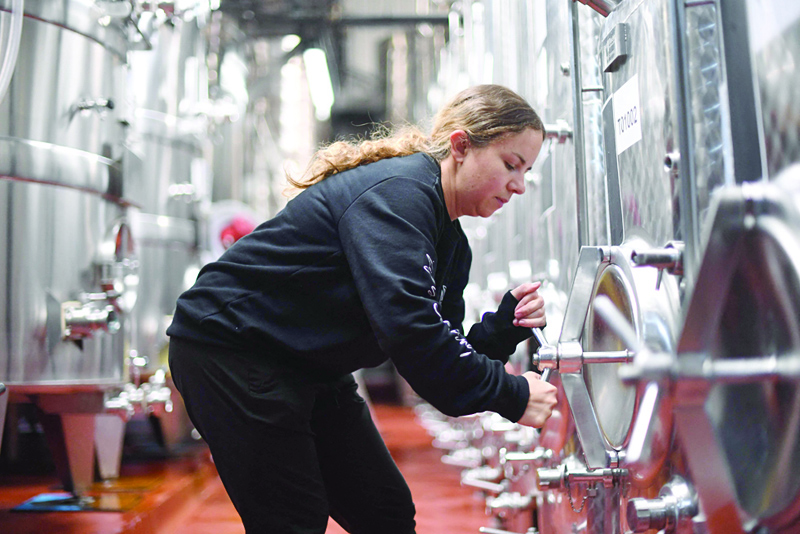 BURGESS HILL: A worker inspects wine vats at Ridgeview Estate's winery near Burgess Hill, southern England. Problems have shaken the lives of many businesses across the country since the UK's effective exit from the single market in early January, without it being yet possible to know whether they will be temporary or sustainable. - AFP
BURGESS HILL: A worker inspects wine vats at Ridgeview Estate's winery near Burgess Hill, southern England. Problems have shaken the lives of many businesses across the country since the UK's effective exit from the single market in early January, without it being yet possible to know whether they will be temporary or sustainable. - AFPLONDON: A lone worker kneels among the vines at the Ridgeview winery in southern England, as a dozen or so visitors sample the estate's sparkling wine. Demand for British wine is up domestically but at the same time, Brexit has led to a shortage of seasonal workers, increased costs and red tape.
Across the country, similar problems have disrupted businesses since Britain fully left the European Union in January. But it is not yet clear whether the issues are just teething troubles or more long-lasting. Tamara Roberts, chief executive of the family run wine estate, said finding labour had never been a problem in the past.
"It's only really been this year we have seen real shortages," she told AFP. "It's really tricky with the pandemic and the travel restrictions to see where the pressure is coming from. "We think Brexit pushed people to stay home because we haven't made it easy for them to come."
The political and economic repercussions from Britain's vote five years ago to leave the European Union are far from over. The British wine industry did not take a stand at the time but is now struggling with the consequences. "We have time to consider our options, work with agencies" to find around 20 seasonal workers, "but we don't have a solution," said Roberts.
"We're looking for a chef, we haven't been able to push our offer in that area as we would have hoped," she added. "There is definitely a pressure to increase pay if we're all competing for the same people." At the same time, "we've seen logistics costs tripling" because the red tape for exporting product and importing machines and bottles has become so complicated that Ridgeview now goes through middlemen, she added. "Whether it's Germany or France or Holland, the interpretation of rules are quite different so it's quite hard to navigate."
'Existential threat'
For small businesses, costs are rising quickly and squeezing margins. "We'll probably have an idea by the end of the year of what's short-term, what's long-term," said Roberts. On the up side, domestic demand has jumped given the difficulties of importing foreign wine, especially online. "The hospitality industry hasn't fully reopened. We hope to see a recovery in that, we think that will happen before the recovery in exports," added Roberts. She also noted that the impact of Brexit remains vague.
Much will depend on the bilateral trade agreements signed by Britain and other countries, such as those that have just been agreed with Norway or Australia, or the one under negotiation with the United States. Further north, in Boston, which had the highest number of pro-Brexit votes in 2015, Ian Collinson's flower growing business has reported the same difficulties in finding seasonal workers for times of peak demand, such as Valentine's Day and Mother's Day. Brexit has been a positive in that "demand is high because of the extra friction on imports", he said.
But if the labour issue is not solved, it is "an existential threat to the industry in the UK", he added. Collinson is considering scaling back production and ending it in certain varieties that require more manual labour, in favour of more mechanised blooms such as lilies.
No timber
In London, Sanjay Nairi, complained that Brexit had compounded existing difficulties in sourcing materials for his construction company "Refurb-it-all" because of high demand. "Cement, timber... materials that are coming across from the continent, these have got delay times, the supply chain is unreliable, materials prices are going up practically on a daily basis," he said.
And he too is struggling with labour shortages. "I lost about seven guys," out of a staff of around 20, he said. Yet demand, particularly from individual homeowners who have saved money during the crisis and want to renovate their homes, is high. - AFP









